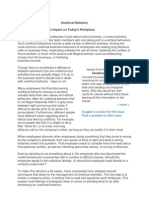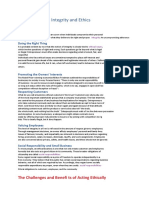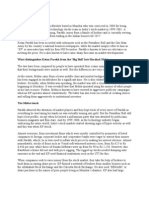Business English Moral Dilemmas Conditionals Practice
Business English Moral Dilemmas Conditionals Practice
Uploaded by
Silvia García BarrioCopyright:
Available Formats
Business English Moral Dilemmas Conditionals Practice
Business English Moral Dilemmas Conditionals Practice
Uploaded by
Silvia García BarrioCopyright
Available Formats
Share this document
Did you find this document useful?
Is this content inappropriate?
Copyright:
Available Formats
Business English Moral Dilemmas Conditionals Practice
Business English Moral Dilemmas Conditionals Practice
Uploaded by
Silvia García BarrioCopyright:
Available Formats
Business English- Moral Dilemmas Conditionals Practice
Choose a situation from below and make a moral dilemma question out of it like “If
someone asked you for a job for their child, would you criticise them for asking?” Most of
the situations are imaginary and so should be second conditional questions with “would”,
but if they are realistic or likely for your partner, please use first conditional with “will”. You
will usually need to add a subject, and maybe other words such as “can” or “could”, to
make a full conditional question. Before your partner answers, tick in the column below
that you imagine their reaction will be. After they answer, say if your prediction was
correct.
Reaction
Situation Yes No May
be
ask you for a job for their child
suggest promoting someone because they are from an
underrepresented group (e.g. an ethnic minority)
suggest a policy which is good for the company but bad for the local
community
offer you a job for less cash in a more socially responsible company
hear about a legal way of paying less tax
hear about an illegal way of paying less tax
learn that your company is doing something illegal
a director gets involved in a personal scandal
learn some gossip about a rival
learn about a takeover before shareholders do
meet two of your main rivals at a social event
have a 97% market share
receive an expensive watch from a potential supplier
receive some smoked salmon from a supplier
have a very attractive PA
make your staff work harder by shouting at them
learn that your boss is having an affair
cut costs by not cleaning water before it goes into a river
make cash by selling what a company owns and closing it
hide losses by moving money around the company
set up in a country where many children work instead of going to
school
customers say they will stop buying until you change
difficult to tell if people are in this country legally
suppliers in a developing country make almost no profit
decide the CEO’s pay and bonuses
Written by Alex Case for UsingEnglish.com © 2015
spend company money on good causes
a supplier really relies on you doing business with them
make staff do unpaid overtime
customers believe anything you say about your products
a future law affects your business
a decision hurts quarterly profit but comes good in two years
Written by Alex Case for UsingEnglish.com © 2015
Try to think of a moral dilemma for each topic below (from above or your own ideas).
accounting scandals/ creative accountancy
asset stripping
backstabbing
blackmail
bribery
bullying
child labour
collusion/ price fixing
community involvement/ being a good neighbour/ stakeholders approach
consumer boycotts/ consumer campaigns
cover-up
damage to the environment/ pollution
diversity policies/ positive discrimination
employing illegal immigrants
excessive management compensation
fair trade products
gift giving
giving to charities
inaccurate product descriptions/ false claims
insider trading
lobbying politicians
monopolistic practices/ profiteering
nepotism
only focusing on short-term profits
PR
sexual harassment
slander/ libel
social enterprises
tax avoidance
tax evasion
whistleblowing
Ask about any words above which you couldn’t understand or couldn’t make conditional
sentences about.
Some of the phrases above are a little different from each other. What are the differences
in these cases?
accounting scandals/ creative accountancy
collusion/ price fixing
community involvement/ stakeholders approach
consumer boycotts/ consumer campaigns
damage to the environment/ pollution
diversity policies/ positive discrimination
bribery/ gift giving
monopolistic practices/ profiteering
slander/ libel
tax avoidance/ tax evasion
Written by Alex Case for UsingEnglish.com © 2015
You might also like
- Selling Building Partnerships 9th Edition Castleberry Tanner Solution ManualDocument14 pagesSelling Building Partnerships 9th Edition Castleberry Tanner Solution Manualjoyce100% (39)
- Who Is Responsible For CSRDocument2 pagesWho Is Responsible For CSREduard Daven GenovaNo ratings yet
- Paciones - CSR Case Study AnalysisDocument10 pagesPaciones - CSR Case Study AnalysisChema PacionesNo ratings yet
- Yes! 50 Scientifically Proven Ways To Be PersuasiveDocument48 pagesYes! 50 Scientifically Proven Ways To Be PersuasiveAlan French100% (1)
- Republic of The Philippines Position Description Form DBM-CSC Form No. 1Document2 pagesRepublic of The Philippines Position Description Form DBM-CSC Form No. 1Randell Manjarres67% (3)
- Chapter 5,6,7Document85 pagesChapter 5,6,7Khánh Linh Mai Trần63% (8)
- Chapter 8: Moral Choices Facing EmployeesDocument36 pagesChapter 8: Moral Choices Facing EmployeesCY BokNo ratings yet
- اخلاقيات العملDocument5 pagesاخلاقيات العملLona CloudNo ratings yet
- Yes! 50 Scientifically Proven Ways To Be Persuasive: Robert B. Cialdini With Noah J. Goldstein and Steve J. MartinDocument45 pagesYes! 50 Scientifically Proven Ways To Be Persuasive: Robert B. Cialdini With Noah J. Goldstein and Steve J. MartinMilos FilipovicNo ratings yet
- What Is Business EthicsDocument4 pagesWhat Is Business Ethicsabegail capistranoNo ratings yet
- Wajiha Tariq. Organizational Behavior. Assignment 1Document4 pagesWajiha Tariq. Organizational Behavior. Assignment 1Amina QamarNo ratings yet
- Bahria University Islamabad Campus: Assignment 1Document4 pagesBahria University Islamabad Campus: Assignment 1Shaquille OatmealNo ratings yet
- Ethical and Unethical Among PracticionersDocument2 pagesEthical and Unethical Among PracticionersChristine ReyNo ratings yet
- Biz Practices and ScamsDocument42 pagesBiz Practices and ScamsBanashree BaruahNo ratings yet
- Unethical Work SituationsDocument1 pageUnethical Work Situationscynthia wainainaNo ratings yet
- Moqadas (18079) - 1Document4 pagesMoqadas (18079) - 1Amina QamarNo ratings yet
- Submitted To: Ma Am Javeria Malik Submitted By: Fatima Tu Zuhra Topic: Case Study Semester: 6 Program: Bba (Evening) DATE: 3/28/2021Document5 pagesSubmitted To: Ma Am Javeria Malik Submitted By: Fatima Tu Zuhra Topic: Case Study Semester: 6 Program: Bba (Evening) DATE: 3/28/2021Amina QamarNo ratings yet
- Business Ethics Q4 WK 3 CheckedDocument16 pagesBusiness Ethics Q4 WK 3 CheckedAlyssa Nicole Mejia RamosNo ratings yet
- Gcwus: Assignment. Topic. Submitted To. Submitted byDocument4 pagesGcwus: Assignment. Topic. Submitted To. Submitted byAmina QamarNo ratings yet
- Ethical Issues, Dilemmas, ImprovementsDocument5 pagesEthical Issues, Dilemmas, ImprovementsHellen ShooNo ratings yet
- There Is No Us in Business: A Practical Guide To Knowing When to Take On a Business Partner (And When Not To)From EverandThere Is No Us in Business: A Practical Guide To Knowing When to Take On a Business Partner (And When Not To)No ratings yet
- Pabiona, Rachell V MEDocument2 pagesPabiona, Rachell V MERaca DesuNo ratings yet
- Good Ethics Is Good BusinessDocument9 pagesGood Ethics Is Good BusinesssumeetpatnaikNo ratings yet
- Full Download of Ethics in Accounting A Decision-Making Approach 1st Edition Klein Solutions Manual in PDF DOCX FormatDocument51 pagesFull Download of Ethics in Accounting A Decision-Making Approach 1st Edition Klein Solutions Manual in PDF DOCX Formatokiefcigua100% (1)
- Bus. EthicsDocument11 pagesBus. EthicsRuby Joy Lopez100% (1)
- Dont Trust EmployersDocument11 pagesDont Trust EmployersmarkbaddauNo ratings yet
- MPOB Assignment 3 UpdatedDocument2 pagesMPOB Assignment 3 UpdatedNave2n adventurism & art works.No ratings yet
- GC Women University Sialkot: Assignment #Document4 pagesGC Women University Sialkot: Assignment #Amina QamarNo ratings yet
- Business EticsDocument1 pageBusiness EticsTiberiu TituNo ratings yet
- Chapter 5 DQDocument5 pagesChapter 5 DQelizabethc.chaneyNo ratings yet
- What Causes Small Businesses To Fail?: Eleven Common Causes of FailureDocument11 pagesWhat Causes Small Businesses To Fail?: Eleven Common Causes of FailureZelalem JemereNo ratings yet
- Week 1 AssignmentDocument5 pagesWeek 1 Assignmentkeri.cobbNo ratings yet
- Professional Values and Business EthicsDocument38 pagesProfessional Values and Business Ethicscliffton malcolm tshumaNo ratings yet
- Elton John Demetita - Unit II Activity 2 Business Ethical CasesDocument6 pagesElton John Demetita - Unit II Activity 2 Business Ethical CasesLaiven Ryle100% (1)
- Filipino ValuesDocument5 pagesFilipino ValuesErza Kiena TsukishimaNo ratings yet
- Based On The Article, Identify The Ethical Issues and Discuss Why The Activities Are Alleged To BeDocument1 pageBased On The Article, Identify The Ethical Issues and Discuss Why The Activities Are Alleged To BeCaiti brownNo ratings yet
- GGSR - Chapter 3Document30 pagesGGSR - Chapter 3Sehunnie OhNo ratings yet
- Deontology-ActivityDocument2 pagesDeontology-ActivityCyril Grace BoocNo ratings yet
- Indian Ethos and Business EthicsDocument30 pagesIndian Ethos and Business Ethicsyashkakade100% (1)
- GEC11 Module 5Document13 pagesGEC11 Module 5May BlackNo ratings yet
- Answers - Test - Strategic Management Class 0322Document5 pagesAnswers - Test - Strategic Management Class 0322Kuzi TolleNo ratings yet
- Work for Yourself: 20 Questions You Must Answer to Start Your Own BusinessFrom EverandWork for Yourself: 20 Questions You Must Answer to Start Your Own BusinessNo ratings yet
- How To Start Business NewDocument18 pagesHow To Start Business NewsunilkumarchaudharyNo ratings yet
- PDF 0051 Work at Home Businesses PDFDocument12 pagesPDF 0051 Work at Home Businesses PDFDra MetzNo ratings yet
- Business Ethics Final Project.Document5 pagesBusiness Ethics Final Project.Raheel HasanNo ratings yet
- Entrep Exam Reviewer 1 1Document7 pagesEntrep Exam Reviewer 1 1geraldinellosa2096No ratings yet
- Personal Business Ethics SurveyDocument7 pagesPersonal Business Ethics SurveyAlbert VelezNo ratings yet
- Unethical Behavior Unethical Behavior - It's Impact On Today's WorkplaceDocument15 pagesUnethical Behavior Unethical Behavior - It's Impact On Today's WorkplaceBernward MwakatunduNo ratings yet
- The Ultimate Online Customer Service Guide: How to Connect with your Customers to Sell More!From EverandThe Ultimate Online Customer Service Guide: How to Connect with your Customers to Sell More!No ratings yet
- Buss 207 L7Document7 pagesBuss 207 L7Emmacue tNo ratings yet
- Govt Emerson College, Multan: Name: Iqra KhalilDocument21 pagesGovt Emerson College, Multan: Name: Iqra KhalilZain ShahidNo ratings yet
- Business Ethics and Social Responsibility-SHS: Learning CompetencyDocument14 pagesBusiness Ethics and Social Responsibility-SHS: Learning CompetencyMizza Moreno Cantila71% (7)
- Bill Bartmann Interview PDFDocument63 pagesBill Bartmann Interview PDFJohn TurnerNo ratings yet
- BROCHURE1Document5 pagesBROCHURE1Hajie RosarioNo ratings yet
- The Legal Side to Starting a Business for Beginners: How to Choose between an LLC and Corporation, Set up Agreements with Partners and Contractors, and Protect your Personal Assets and Intellectual PropertyFrom EverandThe Legal Side to Starting a Business for Beginners: How to Choose between an LLC and Corporation, Set up Agreements with Partners and Contractors, and Protect your Personal Assets and Intellectual PropertyNo ratings yet
- Business Ethics and Social ResponsibilityDocument10 pagesBusiness Ethics and Social ResponsibilitynotesbyaybanNo ratings yet
- Entrepreneurial Integrity and EthicsDocument4 pagesEntrepreneurial Integrity and EthicsLuckyNBNo ratings yet
- Starting A Small BusinessDocument6 pagesStarting A Small BusinessMark LinsellNo ratings yet
- Individuals Lie To Gain An Advantage Over An Opponent or Another Individual. This OftenDocument2 pagesIndividuals Lie To Gain An Advantage Over An Opponent or Another Individual. This OftenEdnalyn RamosNo ratings yet
- How Do I Get Money To Start A Business With Little To No Money? - Special EditionFrom EverandHow Do I Get Money To Start A Business With Little To No Money? - Special EditionRating: 4.5 out of 5 stars4.5/5 (2)
- Listening 2 - 1 9Document3 pagesListening 2 - 1 9Silvia García BarrioNo ratings yet
- Unit Test 4: Feel About TechnologyDocument2 pagesUnit Test 4: Feel About TechnologySilvia García BarrioNo ratings yet
- ANCIENT EGYPTIAN COSMETICS Con Trad y VocDocument2 pagesANCIENT EGYPTIAN COSMETICS Con Trad y VocSilvia García BarrioNo ratings yet
- The First Thanksgiving: CharactersDocument4 pagesThe First Thanksgiving: CharactersSilvia García BarrioNo ratings yet
- A Christmas Letter: Esl / Efl ResourcesDocument3 pagesA Christmas Letter: Esl / Efl ResourcesSilvia García BarrioNo ratings yet
- After You Watch : 1. Choose The Correct OptionDocument2 pagesAfter You Watch : 1. Choose The Correct OptionSilvia García BarrioNo ratings yet
- Engexam - info-FCE Listening Practice Test 14 PrintableDocument2 pagesEngexam - info-FCE Listening Practice Test 14 PrintableSilvia García BarrioNo ratings yet
- Engexam - info-FCE Listening Practice Test 14 PrintableDocument2 pagesEngexam - info-FCE Listening Practice Test 14 PrintableSilvia García BarrioNo ratings yet
- Ana Doesn't Understand How I Feel (I Wish .)Document4 pagesAna Doesn't Understand How I Feel (I Wish .)Silvia García BarrioNo ratings yet
- Ancient Egyptian CosmeticsDocument2 pagesAncient Egyptian CosmeticsSilvia García BarrioNo ratings yet
- Choose The Correct Alternative To Complete The SentencesDocument3 pagesChoose The Correct Alternative To Complete The SentencesSilvia García BarrioNo ratings yet
- In Re ManzanoDocument2 pagesIn Re ManzanoAndrea JuarezNo ratings yet
- Amit Arora: Executive SummaryDocument4 pagesAmit Arora: Executive SummarySourabh SharmaNo ratings yet
- Chapter 2-2 - OSHA Act 1994Document53 pagesChapter 2-2 - OSHA Act 1994Ikhmal Hisyam0% (1)
- Notes in Agency and TrustsDocument11 pagesNotes in Agency and TrustsFrances Angelie NacepoNo ratings yet
- Cde Create Manage JobsDocument28 pagesCde Create Manage JobsafiantaraNo ratings yet
- MDocument12 pagesMapi-3745637No ratings yet
- Arula Vs EspinoDocument6 pagesArula Vs EspinoNikki Joanne Armecin LimNo ratings yet
- The Managerial Revolution - James Burnham (1941)Document235 pagesThe Managerial Revolution - James Burnham (1941)topbudget60% (5)
- Monthly Prayer TimesDocument2 pagesMonthly Prayer TimesLot LovNo ratings yet
- Unit-4 Cloud ComputingDocument11 pagesUnit-4 Cloud ComputingMansi JadonNo ratings yet
- Topic One Up Three QuestionsDocument5 pagesTopic One Up Three Questionsvictor marcoNo ratings yet
- Thesis On Barangay Justice SystemDocument8 pagesThesis On Barangay Justice Systemfjjf1zqp100% (2)
- Indian Navy DocumentDocument2 pagesIndian Navy DocumentAniruthaanNo ratings yet
- Institution That Govern The Practice of Town Planner in Malaysia and Function of The Board of Town Planners in MalaysiaDocument3 pagesInstitution That Govern The Practice of Town Planner in Malaysia and Function of The Board of Town Planners in MalaysiaAjim Senamo D'clubNo ratings yet
- 8 Preysler, Jr. v. Manila Southcoast Development Corporation PDFDocument10 pages8 Preysler, Jr. v. Manila Southcoast Development Corporation PDFjuan dela cruzNo ratings yet
- Spiders: Module # 2-Component # 4Document43 pagesSpiders: Module # 2-Component # 4kjngoccNo ratings yet
- Investigating WSL EndpointsDocument66 pagesInvestigating WSL EndpointsMindSmithNo ratings yet
- Unit 4: Electrostatics: by Rubbing (Friction), Bodies Are Oppositely ChargedDocument41 pagesUnit 4: Electrostatics: by Rubbing (Friction), Bodies Are Oppositely ChargedDandy H HerkoNo ratings yet
- This Is What Happens When Federal Employees Are Not MonitoriedDocument13 pagesThis Is What Happens When Federal Employees Are Not MonitoriedJones, Walker100% (2)
- Monetization TawarruqDocument4 pagesMonetization Tawarruqbilal khanNo ratings yet
- G.R. No. 200274 Domingo v. Spouses Molina 20 April 2016Document2 pagesG.R. No. 200274 Domingo v. Spouses Molina 20 April 2016Red CollinsNo ratings yet
- Ketan Parekh Scam CaseDocument10 pagesKetan Parekh Scam CaseGavin Lobo100% (1)
- MBA5014 Assessment1-1Document8 pagesMBA5014 Assessment1-1AA TsolScholarNo ratings yet
- 11 Beam On Elastic FoundationDocument8 pages11 Beam On Elastic FoundationHemanta DikshitNo ratings yet
- Body Work Octavia Mk3Document438 pagesBody Work Octavia Mk3PatrikNo ratings yet
- Contentonly Aspx PDFDocument26 pagesContentonly Aspx PDFAminata Koodé KaneNo ratings yet
- Cyber Security Strategy: Ministry of Defence EstoniaDocument36 pagesCyber Security Strategy: Ministry of Defence EstoniadkiaNo ratings yet
- SUMMATIVE TEST 4Q Module 2Document4 pagesSUMMATIVE TEST 4Q Module 2Marivic Bernardo GalvezNo ratings yet




































































































